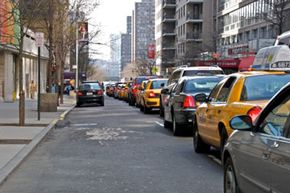Way back in 1891, inventor John William Lambert was trying out his new "horseless carriage" when he crashed into a hitching post. His top speed was only 5 miles per hour (8 kilometers per hour), so injuries were minor. But it's also safe to say that Lambert had no insurance to cover this, the very first auto accident on record [source: Ohio History].
We've come a long way since then. Today, every state requires drivers to carry insurance, and what you pay for insurance over the life of your vehicle can be greater than the cost the car itself. As you probably know, insurance companies base their rates on many factors, including your age, driving record, marital status and the type of car you own. What may come as a surprise, though, is that where you live also has a significant effect on your insurance premium. The reason is simple: Your place of residence influences your likelihood of having an accident, as well as how much the mishap might cost. Higher claims translate into higher premiums.
Advertisement
Insurance companies are likely to ask a series of questions about your particular area to figure out how big a potential risk you'll be [source: Ruuska]:
- How densely populated is it? City drivers almost always pay more than their country cousins. Put simply: More cars mean more fender benders. Rates in Vermont, for example, are among the lowest in the United States. Plenty of empty roads.
- What's the weather like? Snow and ice translate into skids and crashes. But it's not just rough winters that raise rates. Oklahoma sometimes has serious hail storms that leave cars pockmarked. A flood-prone area also can mean higher premiums.
- Do you live in a high-crime area? Grand theft auto is no game to insurance companies. Break-ins and vandalism also raise claims and rates.
- Are local roads well designed and maintained? Pot holes and dangerous intersections can fuel accidents and insurance claims.
Insurance companies factor the answers to these questions into the rates they offer you. But it gets even more complicated. Some location-related factors that can bump your premiums are quite surprising. Read on to find out what they are.
Advertisement



